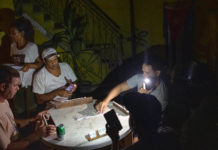The line of eight vehicles made its way up the dirt road shuttling loaves of bread, folded sweaters, antibiotics and a warm sense of solidarity up to the broken mountain. An hour up the road into the Atlas Mountains from the provincial capital of Taroudant, the caravan came to stop in a darkened village that a group of volunteers had heard was in need of help.
The volunteers had been driving all day from their homes in distant cities. Pulling out flashlights and attaching headlamps, the motley group clambered over mounds of rubble, peaked at long cracks along walls and bent down to assess the spot where neighbors had dug out a 32-year-old man and his six children who had been eating dinner when the earthquake struck.
They had survived, but their home was destroyed, their wooden front door propped up against a jumbled pile of mud bricks and broken wood.
Much of the rescue efforts in these remote areas has been spearheaded by residents, with relief supplemented by volunteers in the days since an earthquake in Morocco — the strongest to hit the area in more than a century — killed at least 2,862 people and injured another 2,562, according to figures released by the Interior Ministry.
The volunteers in the village of Douar Bousguine, Morocco, next came to a clearing where 15 women sat in a makeshift communal bedroom — woven plastic mats spread over the dirt, an overhead tarp held up by a long stick. Some wore fluffy bedtime robes over their gowns. “We lost everything,” said Khaddouj Boukrim, 46, who greeted the visitors with a warm handshake and a smile despite the crisis. “It’s very cold. We don’t have mattresses.”
A medical student in the group, dressed in navy scrubs, snapped on blue latex gloves and looked through the cardboard box brimming with medical supplies that he had brought. He treated a pregnant woman’s infected finger and a young mother’s swollen bruise. It was clear his team was offering more than medical help.
“We just wanted to help people,” explained Mehdi Ayassi, his friend, who was holding up his cellphone as a makeshift surgical light. Mr. Ayassi, 22, had quit his job at a Marrakesh hotel to aid in the rescue efforts with his friends. He said the earthquake, and the tragedy that has followed, made him realize that he wanted to do something else with his life.
Many regular citizens are filling their vans with supplies and heading deeper into remote places in the distant Taroudant Province, where professional help had yet to arrive.
“I went expecting misery,” said Yves Le Gall, a French owner of a hotel inside the fortifications of the provincial capital, who spent five hours carrying loaves of bread and bananas up to villages in the nearby Atlas Mountains where he normally sends his guests for hikes. “But I found Moroccan solidarity.”
A large group of volunteers from the coastal city of Safi formed over Facebook, and combined forces with Mr. Ayassi and his friends from Marrakesh after a chance encounter at a gas station en route. At 11 p.m., they handed out bags of flour, cheese, sugar, toilet paper and clothes to a crowd gathered on the dark road.
People shook hands and introduced themselves warmly. A donkey brayed in the distance.
The ambience was strangely festive, with locals saying they were relieved someone was helping, and the volunteers happy to have found a place to pour their empathy.
But there was also frustration.
Mosa’ab Mtahhaf, the medical student from Marrakesh, said he had come prepared for open wounds and broken bones, but found mostly long-term ailments to treat. Villagers had already taken their badly injured neighbors to the hospital.
“These people were already poor. Now, they have nothing,” said Yousef Errouggeh, 29, a cook in a Paris restaurant who was back in his childhood village to help. “They don’t need food. They need someone to rebuild their houses. How will they sleep when the rain comes?”
He continued: “The situation is really bad. Everyone we’ve seen here is a fellow citizen, not the government.”
Mr. Ayassi and his friends agreed that they would continue up the mountain to find other villages, perhaps ones harder hit. They had no idea where they would sleep that night. Nor, really, when they would go home.
“When all our supplies are gone,” he said.
Source : Nytimes













